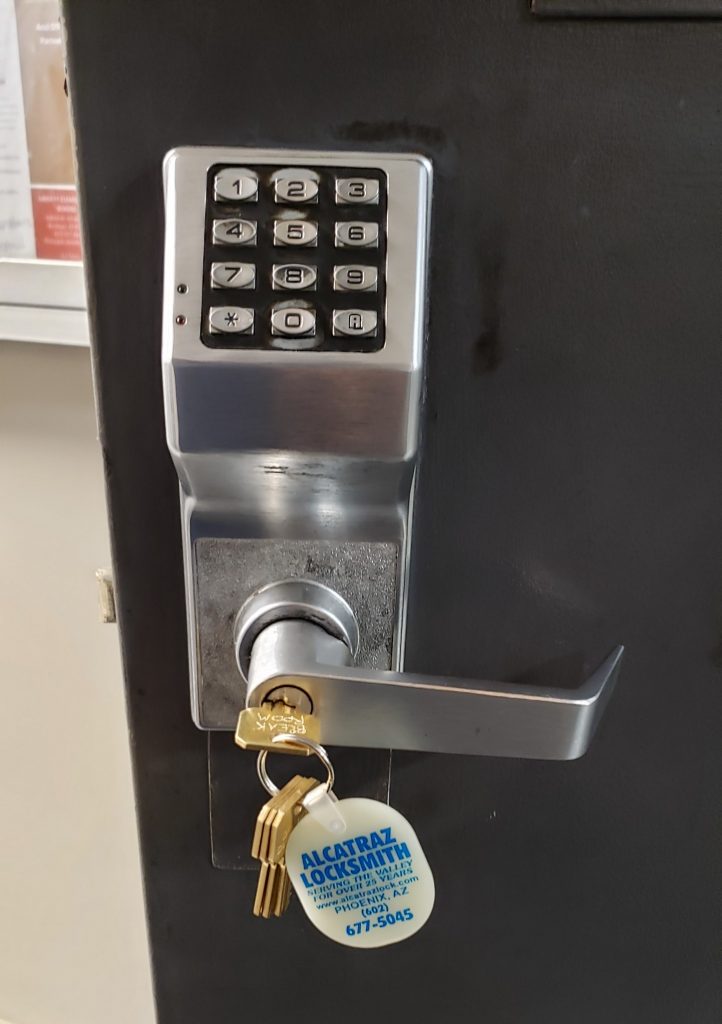Electronic locks or smart locks have been gaining popularity over the last decade as they offer numerous benefits over traditional keyed locks.
These locks have several automated featured that makes them very attractive and numerous cutting-edge security providers now sell them at competitive prices for homes and businesses.

The most popular and well known type of electronic locks are electric strikes, electric latch retractions, electromechanical locks, electromagnetic locks, biometric locks, and NFC locks.
They may or may not have a physical locking mechanism as well.
Electrical currents are required
Electrical currents are used to power a motor, a solenoid, or an electromagnet depending on the composition of the lock in question.
Such locks are typically either fail-secure or fail-safe.
The current is needed to both open and close the lock, and you essentially need an electronic key to do both.
The definition of a key is broad in this sense as it could be a traditional key, a code, a retinal scan, an NFC signal, or some other electrical mechanism.
Traditional locks typically rely on some variation of the ‘pin and tumbler’ method for their mechanisms.
When a key is inserted, the key essentially moves each of the small metal pins within a lock to a particular distance to create entry.
In an electronic lock, an actuator is used to connect the bolt to a motor which may or may not be buried within a door.
This motor is controlled electronically and it can be triggered in any way depending on the manufacturer’s choice.
The door lock is opened only when the motor-driven actuator gets the preset electric input.
Types of Electric Locks
- Access control systems: that release the door slip. The user is identified by an RFID card. They can typically be seen in office buildings or hospitals.
- Biometric locks: they also act on the latch lock on the door frame. Usually, the user activates them with the fingerprint. Surely you have seen some if you go to the gym.
- Wireless car keys: practically all cars use them now.
- Electronic locks for mobile opening. These are not so common, but you will certainly see them more and more. The user opens the door via the Bluetooth of the mobile phone or sometimes also via NFC.
- Motorizations of mechanical locks. They are beginning to be seen at the domestic level. They are installed on a mechanical lock from the inside using the conventional key.
How does it affect locksmiths?
Alcatraz Lock specializes in dealing with electronic locks as they are widely considered to be the future for locks.
In this age, being an electronic locksmith is a very profitable career choice, and locksmiths who do not know how to work with electronic locks are at a disadvantage, especially in big cities and suburban areas.
There are several courses offered for locksmiths that provide training in this avenue and they have become exceedingly popular as traditional locksmiths aim to expand their skill set to either retain or expand their customer base.
Conclusion
Most electronic locking mechanisms have their cons such as expense, hackability, and susceptible to damage.
However, they offer far more benefits over traditional locks such as greater security, controlled access, instant resetting, and long-winded, secure codes.
One day the world will have nothing but electronic locks and traditional locks will be obsolete, but in today’s world, practicality takes precedence.
You should ideally make the investment in an electronic locking system only if your security needs are quite high. Of course, if you just want an electronic lock, go ahead!
Need reliable locksmith services? Reach out to Alcatraz Locksmith for fast and professional solutions. We’re here to assist you with all your security needs. Contact us today!
Frequently Asked Questions
What are electronic locks?
Electronic locks are security systems that use electrical currents to operate mechanisms like motors, solenoids, or electromagnets to lock and unlock doors. They replace traditional mechanical locks and can be controlled with electronic keys, such as codes, biometric scans, or NFC signals.
How do electronic locks work?
Electronic locks operate by using electrical currents to trigger a motor-driven actuator that opens or closes the lock. These locks may be controlled by different means, such as keypads, RFID cards, or biometric scanners. The lock only opens when the correct input is received, providing enhanced security compared to traditional keyed systems.
What types of electronic locks are available?
Some popular types of electronic locks include:
- Access control systems: Often used in office buildings and hospitals, these use RFID cards for identification.
- Biometric locks: Activated by fingerprints, commonly found in gyms and secure areas.
- Wireless car keys: Used in modern vehicles to remotely unlock and start the car.
- Mobile opening locks: These can be unlocked via Bluetooth or NFC from a smartphone.
- Motorized mechanical locks: These devices add electronic functionality to traditional mechanical locks for enhanced convenience.
What are the benefits of electronic locks?
- Enhanced security: Electronic locks are more secure than traditional keyed locks due to their complexity and lack of physical keyholes.
- Controlled access: Users can limit and monitor who enters specific areas.
- Instant resetting: You can quickly change the access code or permissions without needing to replace the lock or rekey it.
- Remote access: Many electronic locks allow remote unlocking, perfect for businesses or property managers.
Are electronic locks secure?
While electronic locks provide a higher level of security than traditional locks, they are not immune to hacking or damage. However, the risks can be minimized by using strong encryption, regular updates, and physical security measures such as backup systems and batteries.
